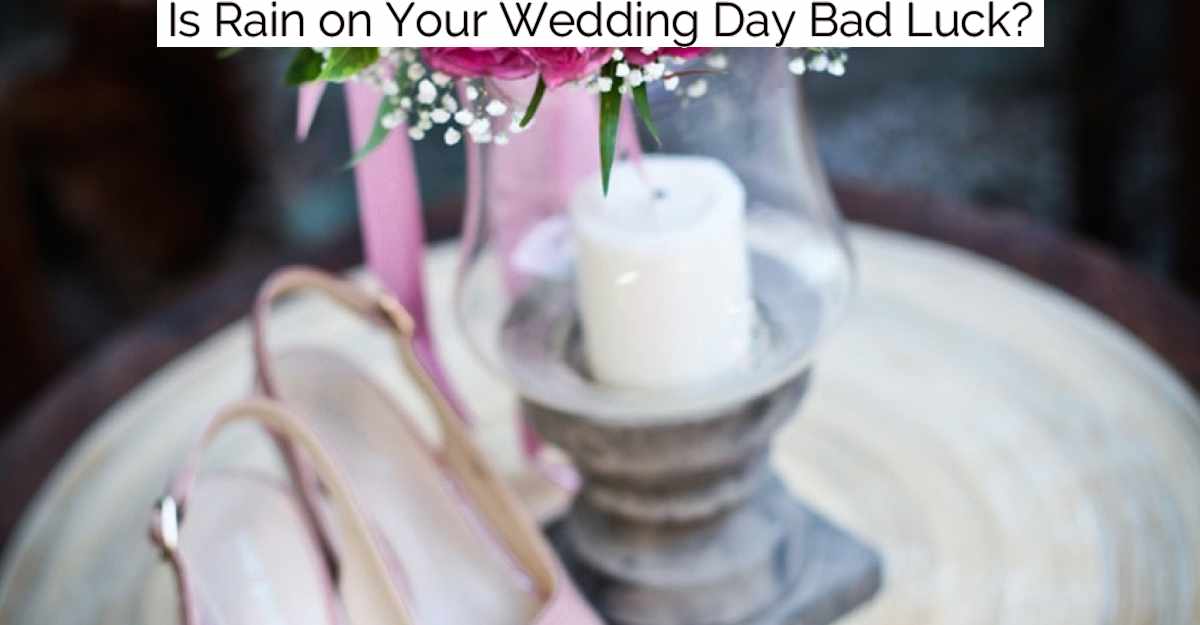Yes, rain on your wedding day is not considered bad luck; in fact, it is often seen as a positive sign in various cultures.
In Hindu traditions, rain is believed to bring blessings of prosperity and fertility, which is a stark contrast to some Western perspectives that might view it as a symbol of a shaky start to marriage.
The Italian phrase "sposa bagnata, sposa fortunata," meaning "wet bride, lucky bride," further underscores the idea that rain can be a good omen.
This shows that cultural interpretations vary, and rain can indeed add a unique and auspicious charm to your wedding day, offering a different perspective on what might otherwise be seen as a setback.
The Superstition Explained
Rain on your wedding day, often viewed through the lens of Western superstitions, is traditionally considered a sign of bad luck. You might hear tales of how rain can symbolize misfortune or wash away a couple’s happiness. However, this belief isn’t universally held. In some cultures, rain is seen positively, reflecting fertility and cleansing.
Analyzing this superstition, it’s essential to understand its roots in agriculture-based societies where weather could influence daily life profoundly. Rain, particularly unexpected or out-of-season, could disrupt outdoor ceremonies and celebrations. Consequently, culturally and historically, the idea that rain could spoil special events became ingrained.
Comparatively, in parts of Asia, rain on a wedding day is often interpreted as bringing good fortune, symbolizing a strong marriage. This belief stems from the notion that rainwater is purifying and sustains life, qualities desirable in a union.
Your understanding of this superstition can vary notably based on your cultural background. While you might view it as a nuisance or an ominous sign in one context, another culture might celebrate it as a blessing. This diversity in interpretation highlights the subjective nature of superstitions and their deep ties to cultural values and environmental factors.
Cultural Beliefs and Traditions
Often, cultural beliefs and traditions shape our perceptions of seemingly ordinary events, like rain on a wedding day. Depending on where you’re from, a downpour can either symbolize misfortune or be seen as a sign of good luck and blessings.
In Hindu traditions, rain is considered a good omen, symbolizing the union of nature and humanity, and a promise of fertility and prosperity. You might feel a sense of harmony with the universe as you step into your new life amidst the gentle showers.
Contrastingly, in some Western cultures, you’re often told that rain can be a precursor to a rocky marriage, drenching your spirits along with your outfit. However, this view isn’t universally held even within Western societies.
For instance, Italians embrace "sposa bagnata, sposa fortunata," which translates to "a wet bride is a lucky bride." This saying reflects a belief in rain as a cleanser, a fresh start that washes away past sorrows.
Analyzing these varied interpretations helps you understand that rain on your wedding day isn’t just a meteorological event—it’s a mosaic of cultural meanings, each adding its unique color to your special day.
Real Stories From Rainy Weddings
While cultural beliefs provide a framework for understanding rain on your wedding day, hearing personal experiences can bring these concepts to life.
Imagine you’re standing under a canopy, rain drumming rhythmically above. For some, this scenario is a symbol of chaos, yet for others, it’s an omen of good fortune. In many Asian cultures, rain is seen as a blessing, a sign of prosperity and fertility.
Contrast this with Western interpretations where a sunny day is often preferred, symbolizing a bright future.
Take Sarah’s wedding in Japan, where unexpected showers led to joyous laughter among guests, embracing the belief that each drop was a token of a prosperous life ahead.
Meanwhile, in Italy, Sofia’s ceremony was met with downpours that initially brought disappointment. However, her grandmother reassured her, citing an old saying that rain washes away the challenges, leaving a stronger foundation for the marriage.
These stories highlight how cultural backgrounds can influence individual perceptions of the same event. They invite you to contemplate how deeply ingrained beliefs shape your reaction to life’s unexpected moments, encouraging a broader appreciation of diverse interpretations of luck and auspiciousness in matrimonial contexts.
Turning Weather Woes Into Wins
Even if rain disrupts your meticulously planned outdoor wedding, you can transform this challenge into a memorable advantage.
Cultures around the world have long interpreted rain on a wedding day variably, with many seeing it as a symbol of blessings and fertility. In Hindu traditions, rain is considered a good omen, signifying a strong marriage. The Yoruba people of Nigeria believe that rain represents the union of heaven and earth, blessing the couple with good fortune.
Embrace these perspectives to reframe any disappointment. Instead of seeing rain as a setback, you can view it as enriching your wedding with a layer of cultural depth and auspicious meaning. This shift in perception not only alleviates stress but also adds a unique element to your wedding story that you’ll cherish in years to come.
Moreover, rain can enhance the emotional and aesthetic dimensions of your ceremony. Overcast skies often make for dramatically beautiful photographs, and the sound of rain can create a cozy, intimate atmosphere.
Practical Tips for a Rainy Day Wedding
If rain is forecasted for your wedding day, it’s crucial to plan strategically to guarantee everything runs smoothly despite the weather.
First, you’ll want to reflect on the cultural implications. In many cultures, rain is seen as a sign of renewal and fertility, adding a layer of symbolic significance to your union. You can embrace this by incorporating water elements in your decor or ceremony script.
Next, analyze your venue options. An outdoor setting without a backup plan is risky; always have an indoor alternative or a sturdy tent setup. This isn’t just practical; it’s a nod to traditional wedding customs in regions like Southeast Asia where monsoon weddings are planned with elaborate indoor contingencies.
Additionally, your attire should reflect both style and functionality. Opt for waterproof makeup and hairstyles that can withstand humidity.
Think about providing guests with amenities such as umbrellas or ponchos, which can be customized as keepsakes—a popular practice in European weddings.
Conclusion
So, is rain on your wedding day truly bad luck? Across cultures, interpretations vary, but many see it as a symbol of renewal and fertility. Remember, those real-life rainy wedding stories often highlight unexpected joy and unity. If the skies open up, embrace it! With some practical planning, a rainy day can transform into a unique, memorable celebration. Think of it as nature’s own twist, adding another layer of story to your special day.







